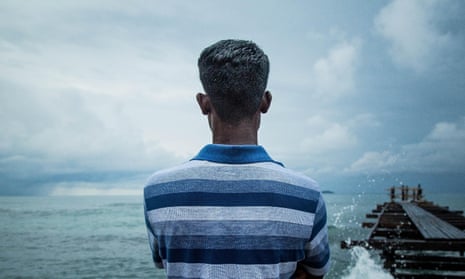The Australian government subjected asylum seekers and refugees to torture, crimes against humanity and the intentional infliction of harm in operating its offshore processing system, two class actions launched on Monday will allege.
The parallel cases, led by Julian Burnside QC and comprising human rights lawyers from the National Justice Project, have been filed in the high court of Australia, representing all the remaining refugees and asylum seekers on Manus Island in Papua New Guinea, and on Nauru.
Both groups, divided by place of detention, are seeking injunctions to stop the government’s alleged breaches of duty of care, and to seek damages.
Their legal team will claim they have been subject to:
Arbitrary imprisonment and other severe deprivation of physical liberty.
Denial of proper medical assessment and treatment.
Inadequate security and protection.
Inadequate food and water.
Inadequate accommodation and an unhygienic environment.
It is claimed this treatment inflicted severe mental and physical pain upon the asylum seekers and refugees.
The National Justice Project, led by the lawyer George Newhouse, said the Australian government was continuing to treat its clients in this manner “in order to deter other people from trying to get to Australia by boat in order to seek asylum”.
“Our clients are seeking to enforce their civil rights rather than criminal prosecution because a prosecution for such acts under the commonwealth criminal code requires the approval of the attorney general,” it said.
There are more than 1,000 people still on Manus and Nauru, most of them found to have a legitimate claim for asylum and be granted refugee status.
Australia has held people in detention or alternative accomodation on Nauru and Manus Island for more than five years. Twelve people have died during that time, including from suicide, untreated medical conditions and murder.
While Australia often claims the respective host countries are in control of arrangements, memorandums of understanding note that Australia is in charge of contracting and operations, and all associated costs.
Crossbench MPs were unable to push through legislation before parliament ended on Thursday which would have allowed critically ill refugees and asylum seekers in the two offshore sites to be brought to Australia for medical care if two doctors agreed to it.
For several years both Manus and Nauru have been dogged by complaints and revelations of poor healthcare, and serious allegations and incidents of officials denying, delaying or blocking the transfers of people who doctors said required urgent medical care.
Dozens of cases have been brought to the Australian federal court by lawyers, seeking legal orders for urgent medical transfer. The Australian government agreed out of court to transfer some, but fought others, unsuccessfully, at a cost of $480,000 in the first quarter of 2018-19 alone.
In September last year a judge approved $70m in compensation to current and former Manus Island asylum seekers and refugees – almost 2,000 individuals – over their illegal detention in dangerous conditions. It was Australia’s largest human rights class action settlement.
In that case the Australian government settled in June rather than go through the expected six-month trial.
At the time the former prime minister Tony Abbott called the compensation decision “a windfall for people who unfairly took advantage of our nation’s generosity”.
A separate case before PNG’s supreme court, also seeking compensation as well as travel documents for more than 730 refugees living in PNG, was dismissed on a technicality in October.
